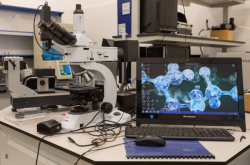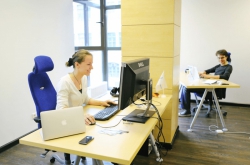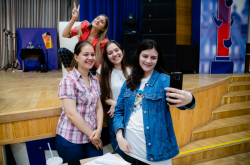Dmitry Dobrykh, “Radiofrequency Systems and Devices”
I got my bachelor’s degree here, at the Department of Photonics and Optical Information. Even two years before I applied for my Master’s, I was working at the lab and doing microwave research in an anechoic chamber. My scientific supervisor, Pavel Belov, told me there was a new Master’s program that would let me fill the gaps in my knowledge and combine research with course work.
This program is great for anyone who is into science; there’s a lot of subjects, modern equipment and staff who love what they do. Science and education are closely connected, and you can study theoretical physics, optics, microwaves, or MRI technology. I used to do research on wireless MRI coils and even wrote my Bachelor’s thesis on it, but I decided to go with something else for my Master’s. I went with topological photonics and even published a few scientific articles in my first year.

As long as you’re involved, there are plenty of opportunities here to produce results and reap the benefits immediately, such as scholarships and conference trips. I went to a conference in Vladivostok last autumn, and one of my fellow students is going to an MRI conference in Paris in a couple of weeks. There’s a special scholarship for high-achieving students, but I must say that studying here is quite difficult.
Shaukat Akhmetzyanov, “Radiofrequency Systems and Devices”
I got my Bachelor’s degree from the Kazan Federal University. My program there was also about radio physics, but it was a bit different and focused on various types of magnetic resonance. After receiving my diploma, I wanted to take my education further and started looking at the different options. I sent messages to various universities, but what I liked about ITMO was how quick they were to respond; I got a reply pretty much immediately and filled out my application online. The head of my program got in touch with me over Skype, interviewed me and sent me a couple tests. I found it stood out for me that the head of the program was so involved in the process.
Master’s programs are somewhat new to Russia, and so not everyone knows how to do them right. Here at ITMO, students are expected to do research and also study intensely. The result is you still study, but you also work a lot. It can be difficult at times, because some of the topics we touch upon are unfamiliar to us. It also depends greatly on your research supervisor, who will suggest literature and guide you in your development. In my program, this entire approach is justified, as metamaterials are at the forefront of science. At the same time, sometimes I get the impression that the academic workload hasn’t been distributed evenly. Many of our academic staff have just began their career as lecturers, and they’ve still got a lot to learn about working with students.

One great advantage is the department scholarship bonuses, which you have to fight for during the mid-semester tests and at the end of each semester during exams. It helps a lot, although it can be difficult to keep it throughout your entire study period.
I do research on MRI. The Almazov National Medical Research Center, for instance, has requested us to measure the gamma-amino-butyric acid levels in mental disorder patients by performing a spectroscopy of their prefrontal cortex. My work concerns the improvement of the results of such scans.
Sergey Lepeshov, SPIE scholarship winner, “Nanophotonics and Metamaterials”

I’ve been working at the Department of Nanophotonics and Metamaterials since 2016. Back then I was still a Bachelor’s student, but already doing research. I knew that there was a Master’s program here where students would get great fundamental training in electrodynamics, mathematical and numerical methods, plasmonics, radio physics and quantum optics. After I got my Bachelor’s degree, despite its reputation for very intense studies and having received a few offers from abroad, I decided that filling in the gaps in my knowledge was a more important task. What I can say for sure about this program is that it is indeed very intense, but the students also get to use their newfound knowledge in practice right away. You get a lot of assignments here, but you acquire actual knowledge and skills when you work on them, something you probably wouldn’t have gained through self-education.





